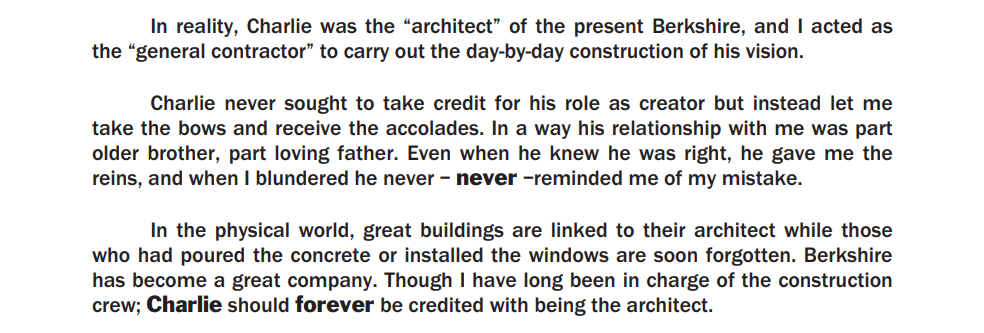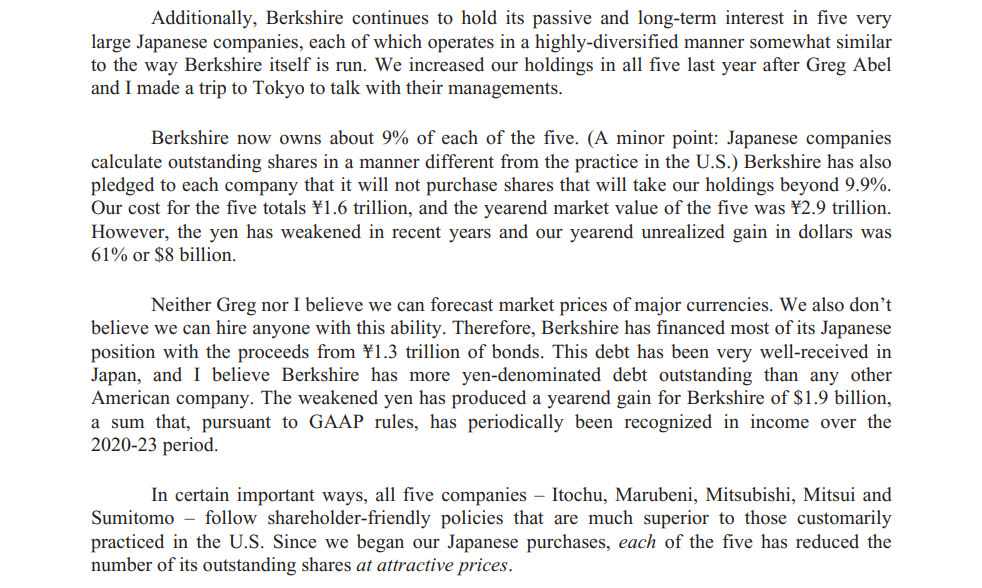Buffett's annual shareholder letter is here! Which highlights are worth watching?
On Saturday (Feb. 24) local time, Warren Buffett's Berkshire Hathaway released its fourth-quarter and full-year 2023 earnings, as well as Buffett's annual letter to shareholders.。
On Saturday (Feb. 24) local time, Warren Buffett's Berkshire Hathaway released its fourth-quarter and full-year 2023 earnings, as well as Buffett's annual letter to shareholders.
The following is an inventory of several important messages in this shareholder letter:
● Tribute to Charlie Munger
harlie Munger was Buffett's business partner and also Berkshire's vice chairman for over 40 years. He passed away in November last year at the age of 99. In the decades of working with Buffett, he assisted him in building Berkshire into a world-class corporate group.
In the shareholder letter, Buffett paid tribute to Charlie Munger and described him as the "architect" of Berkshire.
Buffett wrote, "In fact, Charlie is now the 'architect' of Berkshire, while I am the 'general contractor' responsible for the daily construction of his vision. Charlie has never attempted to attribute his role as a creator to himself, but rather made me bow and receive praise."
"In the real world, great architecture is associated with architects, and those who pour concrete or install windows are quickly forgotten. Berkshire has become a great company. Although I have been in charge of the construction team for a long time, Charlie should always be considered an architect."

● Berkshire has the highest net worth of U.S. companies
In a shareholder letter, Buffett stated, "So far, Berkshire Hathaway's GAAP (General Accounting Principles) net assets are the highest among American companies, with record breaking revenue and strong stock market leading to year-end net assets of $561 billion. In 2022, the total net assets of the other 499 companies in the S&P 500 were $8.9 trillion. (The 2023 figure is not yet available, but it is unlikely to significantly exceed $9.5 trillion.) According to this standard, Berkshire now holds nearly 6% of the market share."
Although Berkshire's net assets are already the highest among American companies, Buffett remains rational about this. In his letter, he bluntly stated, "It's impossible to double our massive base within five years, especially because we strongly oppose issuing stocks (which would immediately increase net assets)."

● "Berkshire is enduring"
Coca Cola and American Express are two long-term holding companies in Berkshire's investment portfolio. Last year, Buffett did not buy or sell any stocks of these two companies, continuing their "dormant policy".
As for why he firmly holds onto these two companies, Buffett believes it is because their products are spread all over the world. "Coca Cola and American Express, along with their core products, have become globally renowned brands, and the consumption of liquids and the demand for unquestionable financial trust are eternal necessities of our world."
"What did Coca Cola and American Express teach us? When you discover a truly exciting business, stick to it. Patience pays off, and an excellent business can offset many inevitable mediocre decisions."
Buffett regards investments in companies like Coca Cola and American Express as "non controlled businesses" with peace of mind. In his letter, Buffett also introduced Berkshire's "other two investments that are expected to be maintained indefinitely."
One is Western oil. As of the end of last year, Berkshire held 27.8% of the common shares of Western Oil Company and also held warrants. For over five years, Berkshire had the option to significantly increase its holdings in the company at a fixed price.

"Although we greatly enjoy our ownership and options, Berkshire is not interested in purchasing or managing Western oil companies. We particularly appreciate its significant oil and gas resources in the United States, as well as its leadership position in carbon capture programs, even though the economic feasibility of the technology has not yet been proven. However, both of these activities are highly in line with our country's interests."
In addition to Western oil, Buffett also turned his attention to Japan's five major trading companies. He wrote in the letter, "Berkshire continues to passively hold shares in the top five Japanese companies for a long time, with each company operating in a highly diversified manner, somewhat similar to Berkshire's own operations. Last year, after Greg Abel and I went to Tokyo to talk to their management, we increased our holdings in these five companies."
The five major Japanese companies mentioned by Buffett are Itochu Corporation, Marubeni, Mitsubishi, Mitsui, and Sumitomo. Berkshire currently holds approximately 9% of each of these five companies. But Berkshire has promised every company that it will not purchase more than 9.9% of its shares.

Buffett also calculated a sum, indicating his success in investing in the top five Japanese companies. Berkshire invested a total of 1.6 trillion yen in these five companies, with a market value of 2.9 trillion yuan at the end of last year. Combined with the weakening of the Japanese yen as a currency factor, as of the end of last year, Berkshire's unrealized US dollar earnings on the top five companies reached 61%, or $8 billion.
In certain important aspects, the five companies Itochu, Marubeni, Mitsubishi, Mitsui, and Sumitomo all follow a shareholder friendly policy, which is much better than the usual practice in the United States. Since we started buying Japanese stocks, these five companies have all reduced the number of outstanding shares at attractive prices. At the same time, the management of these five companies is far less proactive in their own compensation than American companies. It should also be noted that each of these five companies only uses about one-third of their earnings for dividends. The large amount of funds retained by these five companies are used both to establish their own numerous businesses and to repurchase stocks (to a lesser extent). Like Berkshire. "These five companies are also unwilling to issue stocks."
·Original
Disclaimer: The views in this article are from the original Creator and do not represent the views or position of Hawk Insight. The content of the article is for reference, communication and learning only, and does not constitute investment advice. If it involves copyright issues, please contact us for deletion.